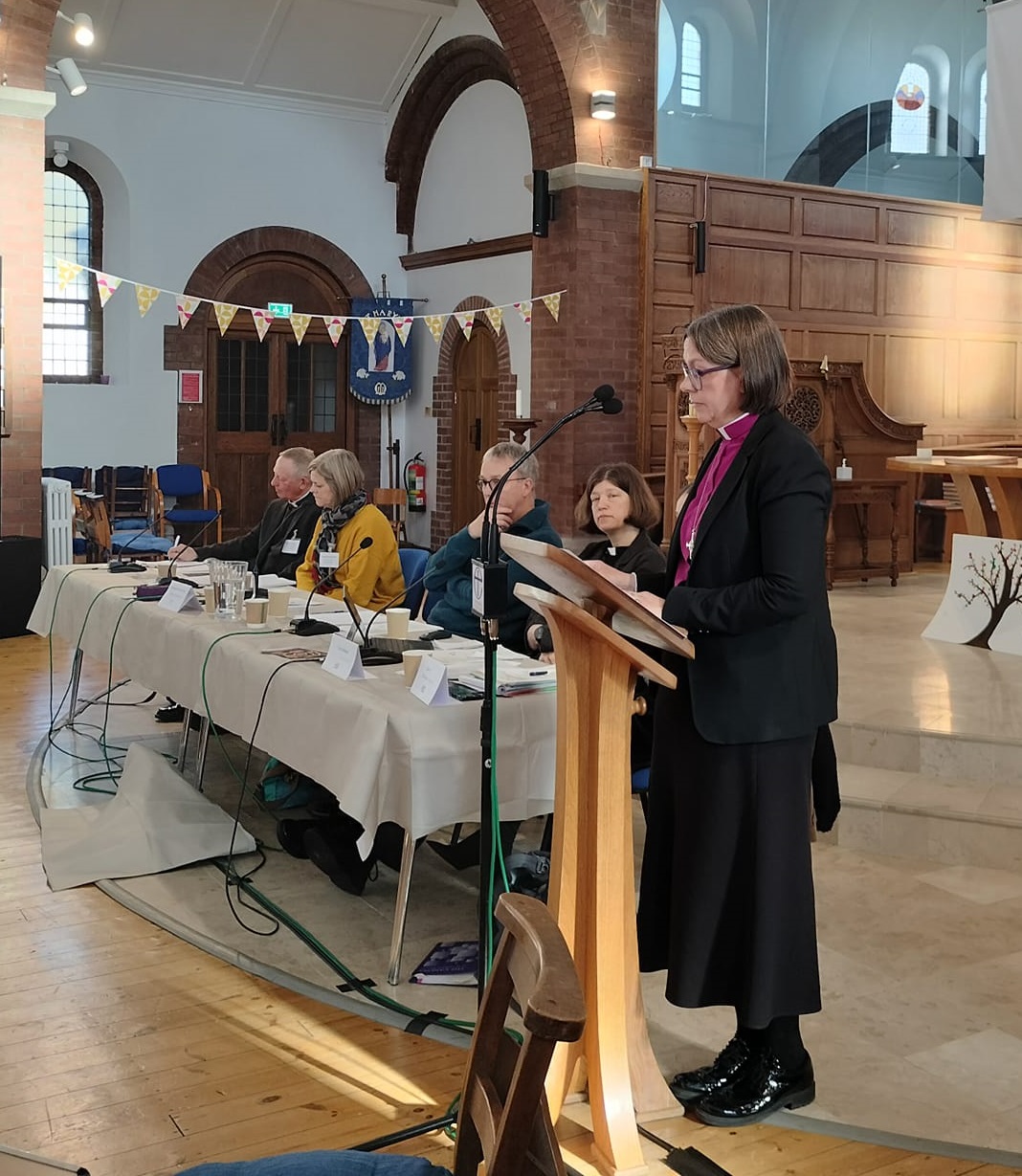 Diocesan Synod took place on Saturday 28 September at St Mary's Church, Monkseaton. Here is Bishop Helen-Ann's Presidential Address.
Diocesan Synod took place on Saturday 28 September at St Mary's Church, Monkseaton. Here is Bishop Helen-Ann's Presidential Address.
A year ago today, I was on my way home from a meeting at Church House. I stopped off at a supermarket to pick up some groceries and happened to check the BBC news. I was shocked to see the headline: ‘Sycamore Gap tree at Hadrian’s Wall cut down by ‘vandals’. I remember sitting in the car taking the news in and sending a few messages to family and friends. I sent a particular message to the Bishop of Leeds as we’d taken Nick and his wife Linda to see the tree just a few weeks before when they visited us. He was completely shocked and asked the question I think perhaps we all have asked at some point about any act that seems pointless and cruel: ‘Why?’
The day after the tree’s felling I visited The Sill. A National Park ranger took me to see the felled tree and I recall the sight of a police officer guarding the site in the extreme wind that was present that day, and the arrival of two detectives to take some forensic tests. It all felt slightly surreal, and it still does I suppose if you visit what is now just a tree stump. Except it is more than that of course. What we see on the surface belies the life-force energy pushing up from underground where there are shoots appearing and signs of new life. I know that the depth of feeling I experienced at that place: the outrage and sadness at the tree lying over the Wall, its leaves beginning to harden in the cold wind had something to do with the time I spent in New Zealand, where Māori saw elements like trees and rivers as having the status of personhood. Perhaps that is why some of the most profound reflections on the climate crisis have come from such lived and rooted peoples with a very different perspective on our human relationship with creation. We surely have something to learn about that for how we view our planet today.
Yesterday, there was a very different sort of energy at The Sill as 240 primary school children gathered at The Sill for a day of creative engagement with the arts in response to the felling of the tree. It was a vibrant event filled with busyness, joy, and moments of profound grace. Our schools (both church and community) are so important to our life together and I am pleased that we will be welcoming a new DDE soon whilst filled with gratitude for the work that Gill Booth has done in the interim.
These reflections leave me with two questions which I think are faith-centred: when we remember, who are we remembering and what are we remembering?
I reflected on these questions during my recent Sunday morning visit to Branxton observing the anniversary 1513 Battle of Flodden, which completely rewrote the political landscape of its day with its effects echoing down the centuries. It was a beautifully still early Autumn morning as a small group of us walked from the church up to the memorial monument to lay a wreath and say a prayer. In such a place of peaceful beauty it was hard to imagine the absolute horror of the battlefield. We see it still however in conflicts the world over, in Ukraine, Sudan, and the Middle East. The church is called to speak into all of this, offering a perspective that reminds us that while memory does matter, how we live matters too. And surely faith matters if it helps to tell a different kind of story, the story of Jesus – incarnate, crucified and risen - of the universality of God’s love, so that a different kind of future can still unfold, for our neighbours and for ourselves. That’s not a naïve hope, it’s a lived reality.
 None of this is about control, possession and zeal, but it is all about commitment to justice and empowerment. We grasp the reality that following Christ is not about maintaining an exclusive club but about offering hospitality and welcome to the stranger, to the very least of all. If we do that, then we can encounter the liberating power of the Gospel and of Jesus Christ. This outwards reach applies to all our work for the sake of the Gospel, and note the emphasis on the word ‘our’. Climate justice is our work. So too is racial justice work is our work, in partnership and voiced hope. At the recent College of Bishops meeting in Oxford we heard powerful testimony from Monique Maddox, a descendant of enslaved peoples who were made to work on plantations in the United States. ‘Stay with the work’ she urged us. That directive of staying suggests that this happens both in season and out of season. In other words, the sowing and harvesting happen all of the time. There can be no rigidity or programmatic control in Kingdom of God! The granularity of our life together demands flexibility and variety. Every community, from our resource church St Thomas’ to our smallest of rural communities have a part to play. The dynamics of seeking sharing sending arose from the invitation by the CNC who sought to find who God was calling to be bishop of Newcastle for candidates (of which I was one) to present on a vision you (yes that’s all of you) discerned in this diocese as part of the CNC process. So seeking, sharing, and sending are a response to a vision of becoming a church turning outwards in mission and becoming younger and more diverse, and an invitation for the years ahead. Seeking is also an opportunity for me as your bishop, exciting because God is and will reveal to all of us exciting, revelatory, and challenging opportunities in this year of seeking - God is the one doing the work through us. I don’t know what the year of seeking will reveal, what we will discover and that’s exciting! As well as unnerving. Remember, Acts 1 didn’t know that Acts 2 was coming! We have work to do: a new Diocesan Secretary to recruit and appoint, and a consultation process to restructure our safeguarding team following the recommendations of our independent audit. Despite the challenges, I remain hopeful and express my gratitude to all of you particularly those who are new to this Synod.
None of this is about control, possession and zeal, but it is all about commitment to justice and empowerment. We grasp the reality that following Christ is not about maintaining an exclusive club but about offering hospitality and welcome to the stranger, to the very least of all. If we do that, then we can encounter the liberating power of the Gospel and of Jesus Christ. This outwards reach applies to all our work for the sake of the Gospel, and note the emphasis on the word ‘our’. Climate justice is our work. So too is racial justice work is our work, in partnership and voiced hope. At the recent College of Bishops meeting in Oxford we heard powerful testimony from Monique Maddox, a descendant of enslaved peoples who were made to work on plantations in the United States. ‘Stay with the work’ she urged us. That directive of staying suggests that this happens both in season and out of season. In other words, the sowing and harvesting happen all of the time. There can be no rigidity or programmatic control in Kingdom of God! The granularity of our life together demands flexibility and variety. Every community, from our resource church St Thomas’ to our smallest of rural communities have a part to play. The dynamics of seeking sharing sending arose from the invitation by the CNC who sought to find who God was calling to be bishop of Newcastle for candidates (of which I was one) to present on a vision you (yes that’s all of you) discerned in this diocese as part of the CNC process. So seeking, sharing, and sending are a response to a vision of becoming a church turning outwards in mission and becoming younger and more diverse, and an invitation for the years ahead. Seeking is also an opportunity for me as your bishop, exciting because God is and will reveal to all of us exciting, revelatory, and challenging opportunities in this year of seeking - God is the one doing the work through us. I don’t know what the year of seeking will reveal, what we will discover and that’s exciting! As well as unnerving. Remember, Acts 1 didn’t know that Acts 2 was coming! We have work to do: a new Diocesan Secretary to recruit and appoint, and a consultation process to restructure our safeguarding team following the recommendations of our independent audit. Despite the challenges, I remain hopeful and express my gratitude to all of you particularly those who are new to this Synod.
Diocesan Synod is an opportunity for growth in good governance not a place for grandstanding or complaint. It is not a place for questions with unvoiced undercurrents of cynicism to be aired. If anyone has a concern, let it be heard openly. Robust engagement yes, from a deep desire for God’s kingdom to be reflected and revealed on earth in our diverse communities as it is in heaven. The more I see and engage in the public square the more I am convinced that the fulfilment of the Gospel lies not in growing churches for the sake of numbers and statistics, but in partnerships forged over common ground in seeking to tackle the many pressing issues of today. We have a Gospel to proclaim, yes, but we do not possess it and we need to be prepared to change how we inhabit our lives as disciples because we encounter people in different contexts. I’ve said this before, we will be changed by this work and engagement. Synod is an important part of our tool kit in supporting our churches, chaplaincies, and schools to do this work. As we inhabit the life of this new triennium, and as we continue to shape our diocesan fabric to equip us to engage in God’s mission I am excited for all that might unfold.
Seek first the kingdom of God and his righteousness, and all these things will be given you as well. So do not worry about tomorrow. (Matt.6.33-34a).